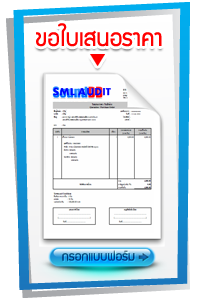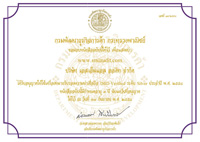บริษัท เอสเอ็มแอล ออดิท จำกัด เลขทะเบียนนิติบุคคล 0115555017811 -สาขาบางนา,สมุทรปราการ
ที่อยู่ : เลขที่ 599/43 ซอยก่อนตึกแอคเซียม ถนนกิ่งแก้ว-บางพลี หมู่ 7 ตำบล : บางพลี
อำเภอ : บางพลี จังหวัด :สมุทรปราการ รหัสไปรษณีย์ : 10540
มือถือ : 080-553-7088 /080-5537077 โทร :023494340 /02-758-8994 แฟกซ์ : 021020819
อีเมล :sale@smlaudit.com, smlaudit@hotmail.com
เว็บไซต์ : www.smlaudit.com
| Procedures for Establishing a Company 1: Forming a Company To set up a limited company in Thailand, the following procedures should be followed: A. Corporate Name Reservation The name to be reserved must not be the same or close to that of other companies. Certain names are not allowed and therefore the name reservation guidelines of the Commercial Registration Department in the Ministry of Commerce should be observed. The approved corporate name is valid for 30 days. No extension is allowed. B. File a Memorandum of Association A Memorandum of Association to be filed with the Commercial Registration Department must include the name of the company that has been successfully reserved, the province where the company will be located, its business objectives, the capital to be registered, and the names of the seven promoters. The capital information must include the number of shares and the par value. At the formation step, the authorized capital, although partly paid, must all be issued. Although there are no minimum capital requirements, the amount of the capital should be respectable enough and adequate for the intended business operation. The Memorandum registration fee is 50 baht per 100,000 baht of registered capital. The minimum fee is 500 baht, the maximum 25,000 baht. C. Convene a Statutory Meeting Once the share structure has been defined, a statutory meeting is called during which the articles of incorporation and bylaws are approved, the Board of Directors is elected and an auditor appointed. A minimum of 25 percent of the par value of each subscribed share must be paid. D. Registration Within three months of the date of the Statutory Meeting, the directors must submit the application to establish the c o m p a n y. Company registration fees are 500 baht per 100,000 baht of registered capital. The minimum fee is 5,000 baht; the maximum is 250,000 baht. E. Tax Registration Businesses liable for income tax must obtain a tax I.D. card and number for the company from the Revenue Department within 60 days of incorporation or the start of operations. Business operators earning more than 600,000 baht per annum must register for VAT within 30 days of the date they reach 600,000 baht in sales.
2: Reporting Require ments Firms must keep books and follow accounting procedures specified in the Civil and Commercial Code, the Revenue Code and the Accounts Act. Documents may be prepared in any language, provided that a Thai translation is attached. All accounting entries should be written in ink, typewritten, or printed. Specifically, Section 1206 of the Civil and Commercial Code provides rules on the accounts that should be maintained as follows: The directors must cause true accounts to be kept: 1.Of the sums received and expended by the company and of the matters in respect of which each receipt or expenditure takes place; 2.Of the assets and liabilities of the company. A. Imposition of Taxes Companies are required to withhold income tax from the salary of all regular employees. A value-added tax of seven percent is levied on the value added at each stage of the production process, and is applicable to most firms. The VAT must be paid on a monthly basis. A specific business tax is levied on firms engaged in several categories of businesses not subject to VAT, based on gross receipts, at a variable rate ranging from 0.1 – 3.0 percent . Corporate income tax is 30 percent of net profits and is due twice each fiscal year. A mid-year profit forecast entails advance payment of corporate taxes. B. Annual Accounts A newly-established company or partnership should close accounts within 12 months from the date of its registration. Thereafter, the accounts should be closed every 12 months. The performance record is to be certified by the company auditor, approved by shareholders, and filed with the Commercial Registration Department, Ministry of Commerce, within five months of the end of the fiscal year, and with the Revenue Department, Ministry of Finance, within 150 days of the end of the fiscal year. If a company wishes to change its accounting period, it must obtain written approval from the Director General of the Revenue Department. C. Accounting Principles In general, the basic accounting principles practiced in the United States are accepted in Thailand, as are accounting methods and conventions as sanctioned by law. TheInstitute of Certified Accountants and Auditors of Thailand is the authoritative group promoting the application of generally accepted accounting principles. Any accounting method adopted by a company must be used consistently and may be changed only with approval of the Revenue Department. Certain accounting practices of note include: Depreciation . The Revenue Code permits the use of varying depreciation rates according to the nature of the classes of assets which have the effect of depreciating the assets over periods that may be shorter than their estimated useful lives. These maximum depreciation rates are not mandatory; a company may use lower rates that approximate the estimated useful lives of the assets. But if a lower rate is used in the books of the accounts, the same rate must be used in the income tax return. Accounting for Pension Plans. Contributions to a pension or provident fund are not deductible for tax purposes unless these are actually paid out to the employees, or the fund is approved as a qualified fund by the Revenue Department and is managed by a licensed fund manager. Consolidation . Local companies with either foreign or local subsidiaries are not required to consolidate their financial statements for tax and other government reporting purposes, except for listed companies which must submit consolidated financial statements to the Securities and Exchange Commission of Thailand . Statutory Reserve. A statutory reserve of at least five percent of the annual net profits arising from the business must be appropriated by the company at each distribution of dividends until the reserve reaches at least 10 percent of the company’s authorized capital. Stock Dividends. Stock dividends are taxable as ordinary dividends and may be declared only if there is an approved increase in authorized capital. The law requires the authorized capital to be subscribed in full by the shareholders. D. Auditing Requirements and Standards Audited financial statements of juristic entities (that is, a limited company, a registered partnership, a branch, or representative office, or a regional office of a foreign corporation, or a joint venture) must be certified by an authorized auditor and submitted to the Revenue Department and (except for joint ventures) to the Commercial Registrar for each accounting year. Auditing standards conforming to international auditing standards are, to the greater extent, recognized and practiced by authorized auditors in Thailand .3: Types of Business Organizations Thailand recognizes three types of business organizations : A. Partnership Thai and Western concepts of partnership are broadly similar. Thailand provides for three general types of partnerships:
B. Limited Companies There are two types of limited companies, i.e. private or closely held companies, and public companies. The first is governed by the Civil and Commercial Code, the second by the Public Company Act . Private Limited Companies in Thailand have basic characteristics similar to those of Western corporations. A private limited company is formed through a process which leads to the registration of a Memorandum of Association (Articles of Incorporation) and Articles of Association (Bylaws), as its constitutive documents. Shareholders enjoy limited liability, i.e., limited to the remaining unpaid amount, if any, of the par values of their shares. The liability of the directors, however, may be unlimited if so provided in the company’s memorandum of association or the articles of incorporation. The limited company is managed by a board of directors according to the company’s charter and by-laws. All shares must be subscribed to, and at least 25 percent of the subscribed shares must be paid up. Both common and preferred shares of stock may be issued, but all shares must have voting rights. Thai law prohibits the issuance of shares with no par value. It also stipulates that only shares with par value of five baht or above may be issued. Treasury shares are prohibited. A minimum of seven shareholders is required at all times. Aprivate limited company may be wholly owned by aliens. However, in those activities reserved for Thainationals, aliens’participation is generally allowed up to a minimum of 49 percent. The registration fee for a private limited company is 5,500 baht per million baht of capital. Public Limited Companies registered in Thailand may, subject to compliance with the prospectus, approval, and other requirements, offer shares, debentures and warrants to the public and may apply to have their securities listed on the Stock Exchange of Thailand (SET).and registration of the memorandum of association of a public limited company, and the promoters must hold their shares for a minimum of two years before they can be transferred. The Board of Directors of a public limited company must have a minimum of five members, at least half of whom are Thai nationals. Shares must have a face value of at least five baht each and be fully paid up. Restrictions on share transfers are unlawful except those protecting the rights and benefits of the company allowed by law, and those maintaining a Thai/foreigner shareholder ratio. Debentures may only be issued with the approval of three quarters of the voting shareholders. The registration fee is 2,000 baht per million baht of capital for a public limited company. C. Joint Venture A joint venture may be described in accordance with general practice as a group of persons (natural and/or juristic) entering into an agreement in order to carry on a business together. It has not yet been recognized as a legal entity under the Civil and Commercial Code. However, income from the joint venture is subject to corporate taxation under the Revenue Code, which classifies it as a single entity. D. Other Forms of Corporate Presence Branches of foreign companies. There is no special requirement for foreign companies to register their branches in order to do business in Thailand. However, most business activities fall within the scope of one or more laws or regulations which require special registration, either before or after the commencement of activities. Foreign business establishments must, therefore, follow generally accepted procedures. It is important to clarify beforehand what constitutes income subject to Thai tax because the Revenue Department may consider revenues directly earned by the foreign head office from sources within Thailand as subject to Thai taxes. As a condition for approval of an Foreign Business License to a branch of a foreign corporation, working capital amounting to a total of five million baht in foreign exchange must be brought into Thailand within certain intervals over a four-year period. The branch may be allowed to operate for a period of five years, unless a shorter period is indicated in the application. Extension of the original duration of the license to operate may be granted, provided the working capital required to be brought into Thailand is met. A re p resentative office of foreign corporations may also be established to engage in limited “non-trading” activities, such as sourcing of goods or services in Thailand for its head office or inspecting and controlling quality of goods which its head office purchases in Thailand. Other activities can cover disseminating information about new products and services of its head office, and reporting to its head office on local business development and activities.Working capital contributions in respect to branches apply. E. Regional Operating Headquarters (ROH) On August 16, 2002, the government introduced a new package to replace the one governing the establishment of regional Offices in Thailand. The package became effective following the announcement of Royal Decrees No. 405 and 406. The package on Regional Operating Headquarters provides tax breaks and incentives to attract foreign companies to establish regional headquarters in the Kingdom. An ROH means a juristic company or partnership organized under Thai law that provides services to its domestic or overseas affiliated companies/or branches. Such services are with regard to administrative, technical, management and other supporting roles, including research and development and training. Requirements
Tax privileges
Personal income tax
shareholders or the owner of the business
F. Regional Trade and Investment Support Offices
Controlling and advising affiliated companies All types of consulting services, except those engaged in: Buying and selling securities
Note: Exceptions may be granted by permission from the Department of Commercial Registration or concerned government agencies
G. Regional Operating Headquarters
Contact SML Audit Accounting Office Phone: 080-553-7088 |


 บุคคลทั่วไป 5 คน
บุคคลทั่วไป 5 คน

